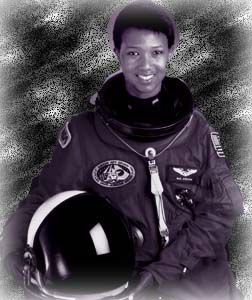![[Metroactive Features]](/features/gifs/feat468.gif)
![[Metroactive Features]](/features/gifs/feat468.gif)
[ Metro | Metroactive Central | Archives ]
NASA as She Wants to Be
 Mae Jemison knows more than rocket science By Michael Learmonth
Back on earth for five years, Mae Jemison is still moving at light speed as a scientist, engineer, medical doctor, college professor and, last but not least, the very first African-American woman to be shot up into space. After docking at the stage door of the Flint Center at De Anza College in Cupertino, she teleports to the backstage lounge. Her small hand becomes the second space object I've ever touched. (The first was the shiny shard of moon rock in the lobby of the National Air and Space Museum in Washington, D.C.) As soon as she hits the couch she starts talking. Fast. "I did always assume I would go into space, ever since I was a little girl," she says. What about the achievement of being a "first?" "I was interested in going into space if a thousand people had gone before me or none had. I would still say, 'I'll go, I'll go, I'll go.' " Must be the NASA training. No race or gender politics in sight. How did it feel to break the white male, fighter-jock, Right Stuff mold? "One of the misconceptions people have about space exploration is that it is a military operation. NASA is a civilian organization. People have that impression because the first astronauts were test pilots." Time's up! "One more thing," she says, waving away her handlers. "The reason I resigned from NASA is I wanted to make sure that everyone was involved in where our future leads. And this technology--space exploration--is a birthright for everyone on this planet." Houston, we have liftoff. She's gone in a cloud of white vapor. In 1993, People magazine named Jemison one of the world's "50 most beautiful people." She makes my Top 10. So I follow her around, but I've got to move fast. After the sound check, she sits down with a gaggle of beaming seventh- and eighth-grade girls from Horner Junior High in Fremont. She asks, "So, what would you like to talk about?" They look like they've seen the spaceship behind Hale-Bopp. One brave girl stands and softly recites the question she's rehearsed all day. "What did you think about being the first African-American female astronaut?" "When I was a little girl, I thought it was incredibly dumb that all the astronauts were guys. They tried to explain it to me, and even now I can't understand." She gets the signal. Time's up again. We go back into the Flint Center auditorium, where Jemison is the featured speaker for Tech Talks '97: "Tales of the Final Frontier." The Tech Museum of Innovation hosts the series, which in the past has featured Ray Bradbury, James Lovell and Lawrence Krauss, the physicist who wrote The Physics of Star Trek. While we're waiting for the program to begin, five Horner students tell me what Mae Jemison means to them, complete with sociopolitical analysis. "She opened doors and showed what African Americans can do," says Johanna Murrain, 13, an African American girl with long, shiny braids falling on her shoulders. "People still have chau ..." she looks up and sounds it out slowly, "chau-van-istic attitudes." "She's a good representative," says Jennifer Lee, 14, who will serve next year as president of her class. "People limit women so much," chimes in Usqima Siddiqi, 14, president of her class. "Who," I ask lightly, "is limiting you?" "There are a lot of stereotypes," says Dagmar Weaver-Madsen, 13. "In toy stores guys play with action figures, and girls play with Barbies." "Where do you think they got Betty Crocker?" Lee accuses. "Come on!" "How come Girl Scouts can't be Eagle Scouts?" Madsen asks. "A lot of times, television shows women from a man's point of view," says Naman Bhatt, 13. "You don't see men running around naked," Murrian adds. "They think women are meat to be shown off." At the end of Jemison's speech, kids on both sides of the auditorium form lines behind two microphones to ask her about weightlessness, becoming a scientist, being a woman and growing up on the south side of Chicago. Then the first adult asks a question: "You appeared on Star Trek: The Next Generation. Would you consider appearing on Babylon 5?" "I'm afraid I've never watched Babylon 5," she replies. But as a girl, Jemison says, she was often disappointed by the roles of women and minorities in sci-fi movies and television. "Star Trek did have women, even if they wore those little short skirts and go-go boots." Jemison's accomplishments are not lost on Johanna Murrain: "I would like to do something like that, like be president." [ Metro | Metroactive Central | Archives ]
| ||||||||||||||||||||||||||||||
This page was designed and created by the Boulevards team.
Copyright © 1997 Metro Publishing, Inc.